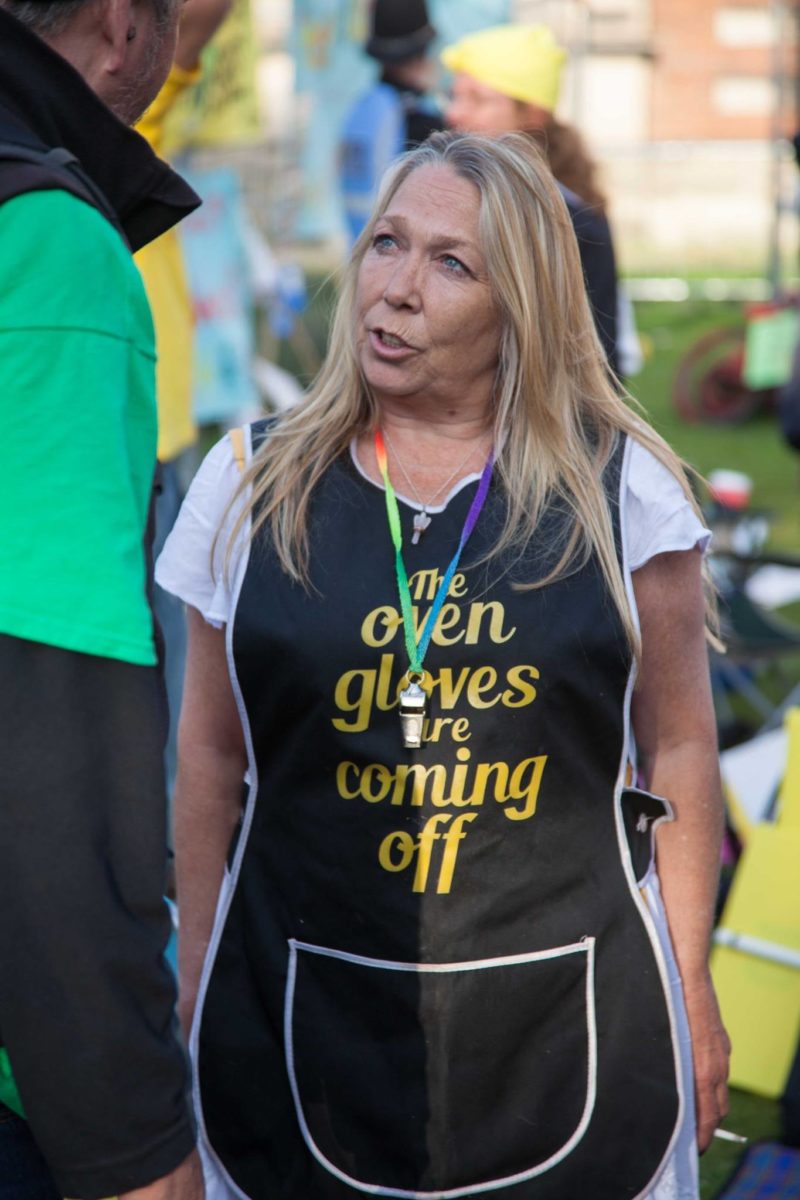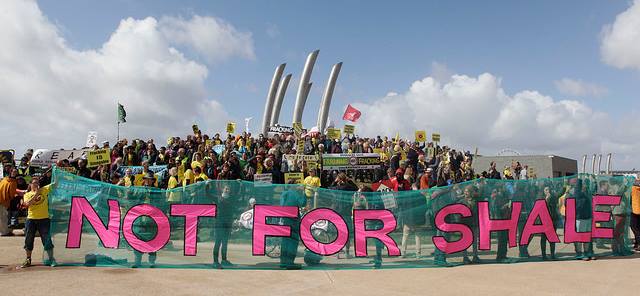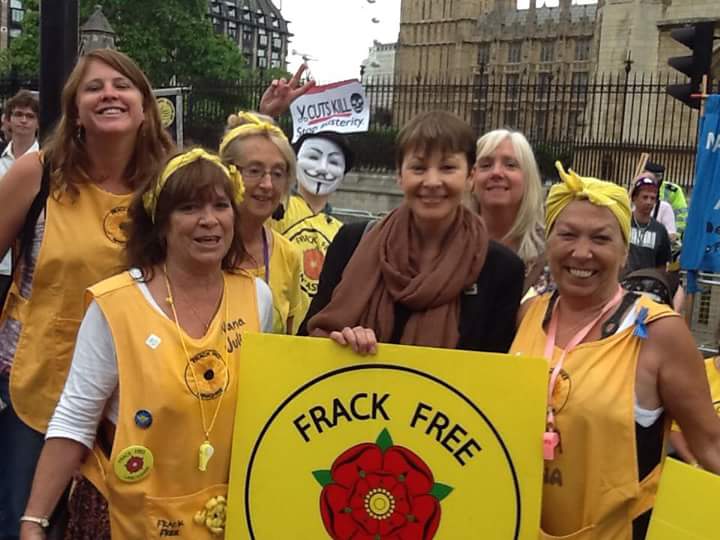As CELDF’s work grows in the United States, we are also working with communities and groups in Nepal, Australia, the United Kingdom, and other countries to advance community rights and the rights of nature.
As in the U.S., we are seeing a growing resistance to environmental laws and legal systems around the world that protect endless growth and extraction over the needs and rights of communities and nature.
We’re very pleased to bring you the story below of people in the UK who are rising up in resistance, and who are finding that they face a very similar structure of law at home as we face in the U.S. – a structure that stands in the way of democratic rights and sustainability. The history of how and why we got where we are today – such that corporate rights override community rights, and nature is treated as property – is long…Magna Carta long…
We Said No! Fracking resistance in the UK
By Melanie Strickland, Solicitor (writing in a personal capacity), London
One of the most inspiring and effective campaigners against fracking in the UK is a cheerful, five-foot grandmother, Tina Louise Rothery. She is one of the Lancashire “Nanas” – a group of mothers and grandmothers who organise against fracking for the sake of their children’s health and wellbeing.

Tina Louise
In 2014, Tina was part of a community protection camp in Lancashire, spending three weeks occupying land rented by the fracking company, Cuadrilla. She was pursued by Cuadrilla in court and has since refused to pay Cuadrilla some £55,000 in costs. Cuadrilla had been renting the land with a view to exploratory drilling. Tina is now being threatened with prison unless she capitulates and complies with the court process, either finding the means to pay or by declaring bankruptcy.
In 2011, Lancashire was the first place in the UK to be subjected to fracking for shale gas. Cuadrilla conducted the fracking, which caused two earth tremors. Since then there has been huge, organised resistance to fracking in Lancashire. Having been alerted to the risks, an anti-fracking movement has also mushroomed nationally, and has been strong enough to keep full-scale fracking out of the UK for years. But the fracking companies believe that there are substantial profits to be made from fracking, and Cuadrilla continues to seek permits for fracking.
The concerns of the Lancashire Nanas were validated by Lancashire County Council in 2015. The Council, having conducted a rigorous process, including consulting widely with residents and experts, refused Cuadrilla’s planning applications for fracking. Cuadrilla then appealed this decision to the current Secretary of State for Communities and Local Government, Sajid Javid MP, who has since overruled the Council’s decision on one of the proposed fracking sites, Preston New Road (the other, Roseacre, is currently on hold).

A stand against fracking in the UK
Other extraction companies are also now seeking to frack in the UK. This includes Third Energy, which earlier this year was granted approval to conduct fracking in North Yorkshire. No fracking has yet taken place, and local people and campaigners are determined to ensure that this industry does not get established.
Tina is one of many courageous people in Lancashire organising to stop fracking. In talking with her, she expresses the responsibility she and others feel for what happens in her community. When the Nanas found out that fracking was being proposed in Lancashire, they educated themselves on its impacts. They learned that it poisoned water, soil, and air in the United States. Further, that fracking released cancer-causing toxins and caused other health impacts. And lastly, they learned that fracking releases methane, a potent greenhouse gas; therefore fracking cannot be compatible with tackling climate change.
Tina and the other Nanas found that they could not stand by and let these harms be imposed on their community, for the sake of their children and grandchildren. The community protection camp Tina was involved in was successful in terms of public outreach, but it has come at a significant personal cost to her.

Tina Louise and friends
Tina’s story demonstrates how our legal system in the UK really works.
The legal system prioritises private property interests above any right to health, clean air, water, and a safe climate. It is true that sustainability is illegal under the present system of law, as the legal system legitimises and protects our economic system that is focused on unlimited growth, which is proving incompatible with sustainability. This is a system that benefits a privileged few.
Anyone who gets in the way of economic growth can expect to be labelled a ”domestic extremist”(or even ”domestic terrorist”) and face punitive legal consequences. Under this system, nature is property and a ”resource” only valued in terms of its financial potential.
[S]ustainability is illegal under the present system of law, as the legal system legitimises and protects our economic system that is focused on unlimited growth.... This is a system that benefits a privileged few.
So how did we get to this stage, where a company has a much greater say in what happens in our communities, than we do? And why are we content to call this state of affairs a democracy? The answer has something to do with how deeply entrenched the notion of private property rights is in our culture.
The Magna Carta in 1215 is considered to be a key moment for democracy. And yet the Magna Carta was the result of a compromise by the king to settle a dispute with the land barons in this country. It was primarily about the barons wanting to protect their property interests from encroachment by the king, not about enfranchising the masses.
Today in the UK, when we hear politicians speak of ”rule of law” – they often mean little more than respect for private property rights and the near sacrosanct ”right” of property holders to do as they want with their property. This occurs regardless of whether that ”property” happens to be land that is home to a range of wildlife, or land that people rely on for food, water, shelter, recreation, and community spaces. Whilst there is now a whole body of environmental law that restricts what companies and natural persons can do with their land, the purpose of this law is the orderly use of resources, or the regulation of harms. It is not fundamentally about protecting nature for its intrinsic value.
In modern times the privileges granted to companies have increased. Companies use human rights law to defend their property rights, because human rights law gives protection to corporate ”persons.“ Importantly in the context of fracking, the Infrastructure Act 2015 contains ‘a duty to maximise economic recovery of petroleum’ (s 41) – in plain English, as George Monbiot puts it, ”a legal duty to maximise greenhouse gases.”
The Infrastructure Act 2015 also authorises trespass by companies to drill under people’s land (s 43). The government has also given clear policy statements setting out its unequivocal support for fracking and fossil fuel industries in the UK in general. Clearly, this cannot be squared with the requirement to reduce emissions under the Climate Change Act 2008.
Community campaigners in the UK have much to learn from their counterparts in the U.S. who have started seizing control of the legal apparatus and are using it to actually serve their communities.
Magna Carta as a symbol of power sharing agreements among the few, permeates our structure of law and governance today, both in the U.S. and globally. This structure elevates corporations and profits over people and nature. This will not change until we build a broad people’s movement to establish rights for people and nature over the systems that control them.
CELDF is spearheading that movement, working to establish rights for humans and nature, and elevating them above oppressive systemic structures. Help us advance those rights in 2017 – donate today.
